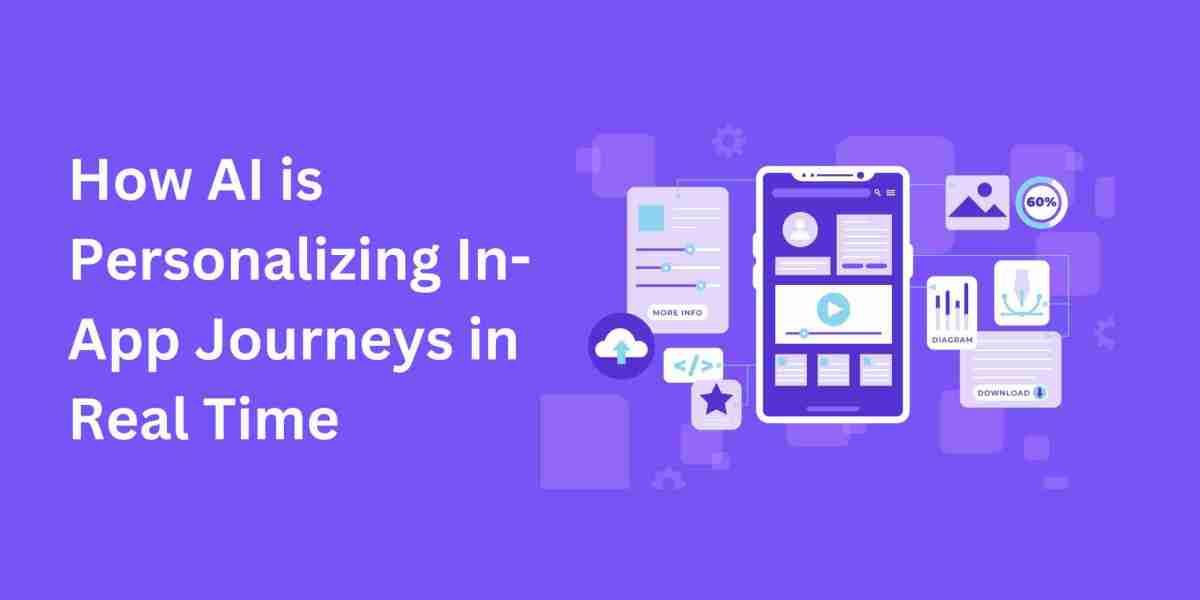Introduction: The Age of Personalization
In a world where everyone is bombarded with countless choices, standing out is no easy task. If you’re a business looking to engage users, offering a generic experience simply doesn’t cut it anymore. Users expect tailored experiences that cater to their individual preferences. Enter AI-powered personalization—the game-changer for mobile apps.
While personalization is hardly new, AI has taken it to new heights, enabling apps to dynamically adjust to each user in real-time. It’s no longer about providing a set of predefined options; it’s about offering a continuously evolving journey based on each user's behavior, preferences, and needs.
But what does this look like in practice? How exactly is AI transforming in-app journeys to make them more intuitive, relevant, and engaging?
In this blog, we’ll dive into the transformative ways AI is personalizing in-app experiences in real-time, what developers need to understand about these capabilities, and why it’s more important than ever to start integrating AI into your app strategies.
Real-Time Data Collection: The Heartbeat of Personalization
Personalization starts with understanding users—and to understand users, you need data. But not just any data. Real-time data is the secret sauce that allows apps to adapt dynamically and continuously. Think of it as the app’s ability to feel its user, learning and responding in real-time.
From location to activity to interaction history, apps are collecting and analyzing a wealth of information. Behavioral data is key here—tracking how users navigate through the app, what they click, how long they spend on specific pages, and which actions they perform most frequently. This data is then processed by AI algorithms that can identify patterns, anticipate needs, and trigger actions accordingly.
For instance, e-commerce apps analyze browsing habits and purchase history to recommend products that match a user's preferences. Fitness apps monitor activity and adapt workout suggestions based on real-time performance.
This real-time data collection allows apps to continually fine-tune the user experience, making interactions feel less transactional and more personal.
Machine Learning Algorithms: Learning User Preferences
At the core of real-time personalization is machine learning (ML). These algorithms power AI to continuously learn from user interactions, enabling apps to predict future behavior and offer tailored experiences.
With each action a user takes, the app’s AI refines its understanding of that person’s preferences. Over time, the more data the app collects, the more accurate its recommendations become. This process is dynamic—meaning it’s not static or rigid, but constantly evolving based on new information.
Let’s consider a music streaming app. When a user first signs in, the app may suggest popular tracks or curated playlists based on broad trends. However, as the user listens to more music, the app learns their tastes: specific genres, preferred artists, and even the type of mood they’re in when choosing music. By the next interaction, the AI algorithm is no longer showing general recommendations; it’s offering deeply personalized playlists that cater to the user’s evolving tastes.
This ability to learn and adapt, in real time, makes AI a powerful tool in creating truly customized in-app experiences.
Contextual Personalization: Adapting to User Behavior in the Moment
What sets AI-powered personalization apart is its ability to respond to the context of the user’s current session. Rather than relying solely on historical data, AI can factor in what a user is doing right at that moment.
For example, a travel app might adjust its suggestions based on the time of day, weather conditions, or even the user’s current location. If a user is at the airport, the app might present flight status updates or nearby restaurants, and if it’s lunchtime, it might suggest local dining options.
Similarly, shopping apps can use contextual information to adjust the shopping experience. If a user is browsing for a specific type of product—say, a new laptop—the app can provide targeted discounts, recommend related accessories, or even highlight items in stock at nearby stores, all based on the user’s location and intent.
In these cases, AI doesn’t just provide a personalized experience—it tailors that experience to the moment, making it feel far more intuitive and relevant.
Adaptive User Interfaces: Evolving with the User
AI is also changing how app interfaces themselves function. Traditional user interfaces (UI) are static—unchanging designs that users interact with in a fixed manner. AI, however, allows the UI to adapt dynamically based on individual user preferences and behaviors. This means that the app interface can evolve to provide an optimal user experience at all times.
For example, a social media app might offer a minimalist interface for new users, presenting only essential features. As users become more familiar with the app, the AI can introduce more complex features, tailored to the specific ways that user interacts with the platform.
In a similar vein, content apps (like news or entertainment apps) can adjust the layout and presentation of content based on the user’s browsing habits. An AI might prioritize certain types of news or videos, moving the interface around in real-time to highlight what’s most likely to keep the user engaged.
This type of adaptive UI allows users to feel like the app is evolving with them, rather than being a rigid, one-size-fits-all experience. It’s personalized not just in terms of content but also in terms of how the user interacts with the app.
Predictive Analytics: Anticipating User Needs
Imagine an app that doesn’t just react to what you do—it predicts what you will do next. This is where predictive analytics comes into play. Using machine learning models trained on historical user data, AI can anticipate a user's next action and proactively present them with relevant content or options.
For example, an e-commerce app might predict that a user is likely to purchase a new phone case after they’ve just browsed a few models. Instead of waiting for the user to take the next step, the app might proactively show phone cases related to the one the user just viewed, offering personalized recommendations or discounts.
Similarly, news apps can use predictive analytics to recommend articles based on the user's interests, even before they start searching for content. The app might push relevant content in real-time, as soon as the user opens the app, reducing the effort required to find what they want.
By predicting user needs and delivering content preemptively, AI helps create a more seamless, frictionless experience. Users feel as though the app is always one step ahead, providing what they need before they even have to ask for it.
Personalized Notifications and Engagement: More Than Just Push Alerts
Push notifications have long been a staple of mobile apps, but AI-powered notifications take them to the next level. By analyzing user behavior, preferences, and context, AI ensures that notifications are not just timely but relevant.
Rather than sending generic updates or reminders, AI can tailor push notifications to a user’s exact preferences. For example:
A fitness app might send reminders to exercise when the user is most likely to engage based on their past activity patterns.
A shopping app could alert a user about a flash sale on a brand they’ve previously purchased or shown interest in.
A news app could push articles on a topic the user has been reading about consistently, without overwhelming them with irrelevant content.
AI allows for a level of hyper-targeted engagement that makes notifications feel less like interruptions and more like useful, relevant updates. Users aren’t annoyed by the alerts—they appreciate the personalized timing and content.
The Impact of AI on User Retention
Personalization doesn’t just improve the user experience—it also drives long-term engagement and retention. By consistently offering value through personalized recommendations, content, and experiences, AI helps users feel more invested in the app. This leads to increased user loyalty and a higher likelihood of continued use.
Apps that can anticipate needs, adapt to preferences, and provide tailored experiences are far more likely to retain users than those offering a static or generic experience. As users continue to interact with an app, the AI learns and improves the experience, creating a cycle of ever-improving engagement.
Challenges in AI Personalization: Data Privacy and Trust
While AI offers incredible potential for personalization, it also raises important concerns, particularly around data privacy. Users must trust that their data is being handled securely and ethically. Developers must be transparent about what data they collect, how it’s used, and the value it brings to the user.
Privacy laws such as GDPR and CCPA are already forcing businesses to rethink how they gather and use personal data. In this context, developers will need to implement robust data protection measures and ensure compliance with local regulations. Personalization must go hand in hand with privacy, or the benefits AI offers could quickly be overshadowed by user distrust.
Conclusion: The Future of Personalization is Now
The ability for AI to personalize in-app journeys in real-time is transforming the mobile app landscape. From adaptive interfaces and predictive analytics to hyper-targeted notifications, AI is reshaping how users interact with their apps. Developers who can master these technologies will not only provide better user experiences—they’ll create loyal, engaged users who feel like the app truly understands them.
As AI continues to evolve, mobile app developers will need to stay ahead of the curve, leveraging these tools to create intuitive, dynamic experiences. For businesses looking to stay competitive, working with expert mobile app developers in Atlanta can provide the guidance and expertise needed to implement cutting-edge AI solutions, ensuring a personalized experience that drives user satisfaction and retention.








